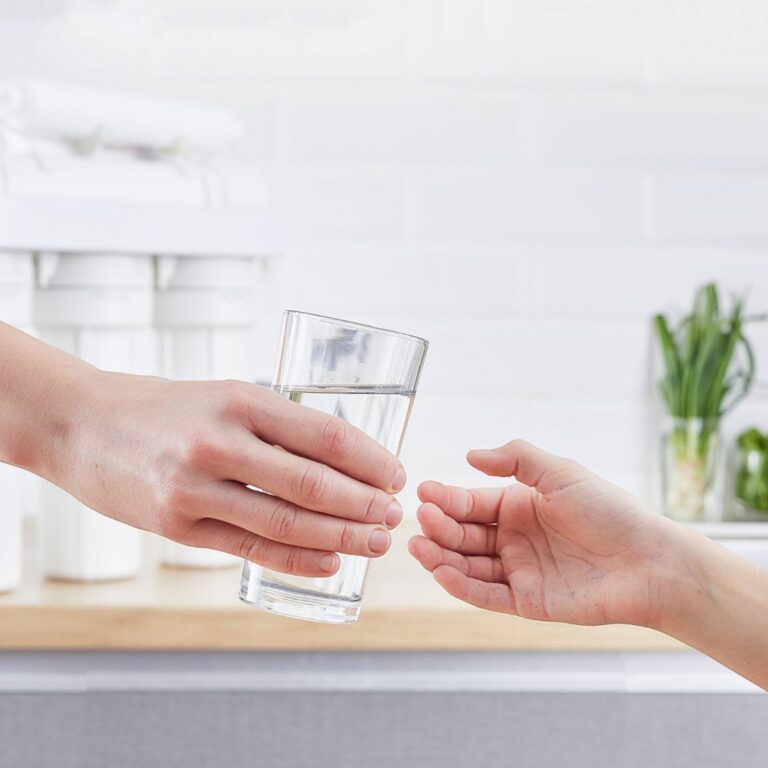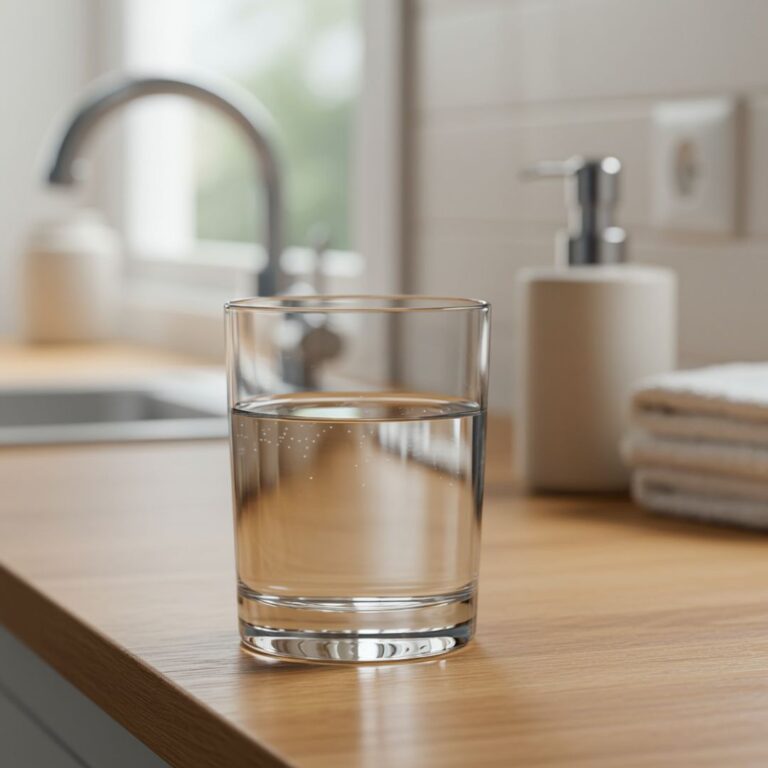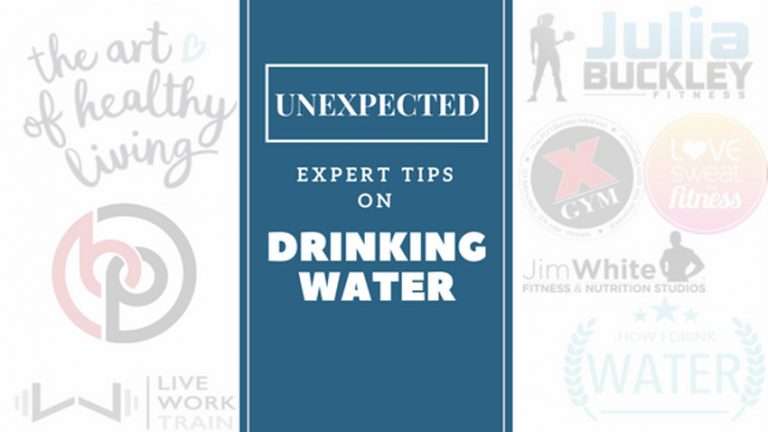Here Are 6 Surprising Reasons That Explain The Importance Of Water Filtration
The Importance of Water Filtration – Guest post written by Holly Radford
= = = = = = = =
The Importance Of Water Filtration
Why Do We Use Water Filters?
Just because your water looks clear and clean, doesn’t mean that it is free from contaminants such as chemicals, heavy metals, and even bacteria
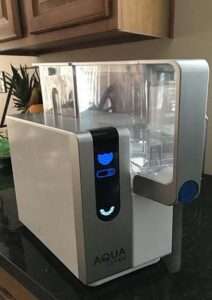 It is impossible to judge water quality by sight or smell or even taste.
It is impossible to judge water quality by sight or smell or even taste.
Many of the contaminants that are cause for concern can go undetected because they are colorless, odorless, and tasteless.
With the increased reports of illness related to drinking water, it is important to know exactly what is in your water for a number of reasons.
Why Filter? Here are 6 Reasons…
1. Contaminated Water Is Bad For Mother and Baby
A healthy diet and good nutrition are crucial during the developmental stages of a fetus.
Pregnant mothers are encouraged to drink plenty of fresh, clean water for proper hydration and to ensure that essential nutrients are delivered to the growing baby.
Contaminated water can pass from the mother to the fetus leading to a variety of health concerns for the baby.
2. Children Need To Drink Water Everyday
Young children are encouraged to drink between four to ten 8-ounce glasses of water each day. Whether they are drinking bottled water, well water, or public water, all water is at risk for contaminants that can impact a child’s health.
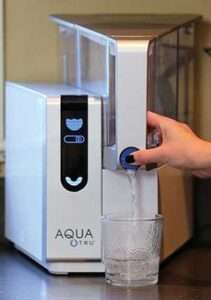 The chemicals and contaminants most commonly found in water supplies can cause serious damage to the developing bodies of young children.
The chemicals and contaminants most commonly found in water supplies can cause serious damage to the developing bodies of young children.
Children are at a higher risk to suffer from health issues related to contaminated water because they drink more water for each pound of their body weight.
Because of their smaller size, they end up consuming a greater percentage of water pollutants, resulting in more dangerous exposure levels when heavy metals and toxic chemicals build up in their bodies.
As their organs and tissues are still experiencing growth, this can cause lasting damage and possible long-term health issues.
3. Adults Need To Drink Water Everyday
As adults, we are encouraged to drink at least eight 8-ounce glasses of water a day.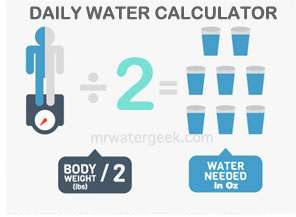
This number can increase drastically if you exercise or are in a hot environment.
Although we know we need to drink enough water for our bodies to properly function, we often forget to check the quality of the water we drink.
4. Different Uses of Water
Clean water is crucial, not just for hydration, but also for cooking and cleaning. The average person requires a total of about five to fifteen gallons of clean, safe water throughout a day.
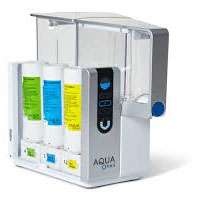 Consider that typical adults start their day using water while taking showers and brushing their teeth.
Consider that typical adults start their day using water while taking showers and brushing their teeth.
Different uses of water:
- Domestic: washing dishes and clothes, cleaning, cooking food, laundry.
- Farming and agriculture: gardening, growing food, plants
- Recreation and exercise: swimming, boating, fishing, rafting.
- Industrial and manufacturing.
We know we need clean drinking water, but we often take for granted how much water we use for other purposes in a single day.
5. Common Contaminants In Water
The EPA sets standards for allowable limits of contaminants in drinking water. However, there is no guarantee that those standards are being met.
Public water supplies are supposed to be regularly tested, but there are no regulations mandating tests for private wells and many bottled water sources.
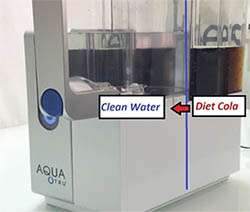 There are many health issues that can be caused by contaminated water and the only way to know for sure what is in your water is to test it.
There are many health issues that can be caused by contaminated water and the only way to know for sure what is in your water is to test it.
Some of the most common water contaminants consist of lead, pesticides, bacteria, iron, nitrates, nitrites, chlorine, and copper.
Symptoms of illness from contaminated water include gastrointestinal issues, vomiting, headaches, and chronic health issues. Knowing what is in your water can help prevent a variety of illnesses.
6. Water Quality Issues
While these eight contaminants can contribute to a variety of health concerns, there are additional factors that impact water quality.
The EPA does not regulate conditions such as alkalinity, pH, and hardness.
Even though these do not pose serious health risks, they may have some unpleasant side effects.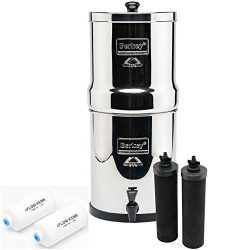 Alkalinity is the ability of water to neutralize acid. The alkalinity of a water source is impacted by the surrounding soil and bedrock.
Alkalinity is the ability of water to neutralize acid. The alkalinity of a water source is impacted by the surrounding soil and bedrock.
Areas high in hydroxide and carbonates may produce water with a high alkaline level. Although not dangerous, it can disrupt the body’s pH, causing gastrointestinal issues, confusion, and muscle tremors.
The pH measurement of water is linked to corrosion levels. Water with a low pH is considered acidic and can absorb metal ions from the environment.
This may lead to a build-up of high levels of toxic metals. High pH levels could be an indication of hard water which causes scaling and damage to plumbing and fixtures.
Hard water is a condition where there is a high concentration of calcium and magnesium, creating a potentially unpleasant taste.
Hard water has no known health effects, but it can cause a buildup of minerals in your pipes and water-using appliances.
![]()
Importance Of Water Quality Analysis
 Some companies offer testing kits that require you collect samples and send them to a lab for analysis.
Some companies offer testing kits that require you collect samples and send them to a lab for analysis.
Although costly it is by far the most effective way to get the most reliable results.
A lab water testing kit is far more accurate than cheap home testing kits.
 These tests allow you to accurately analyze your drinking water and are compatible with well water, municipal water, tap water, spring water sources, and bottled water.
These tests allow you to accurately analyze your drinking water and are compatible with well water, municipal water, tap water, spring water sources, and bottled water.
You can easily test water at home, classroom, school, office. Or anyplace else where you would need to test water quality. Regular testing is the best way to make sure that you are drinking quality, contaminant-free water.
It Converts Coke Into Fresh Drinking Water
The Importance Of Water Filtration – Why You Should Do It and How
(Conclusion written by Luke George – Aka Mr Water Geek)
Regularly drinking water and keeping properly hydrated is important to maintaining good health.
However, regularly keeping hydrated is only good for you if the water itself is of a good quality.
 The water you drink should be fresh, clean and contaminant free. This is the importance of water filtration and why you must filter your water every day.
The water you drink should be fresh, clean and contaminant free. This is the importance of water filtration and why you must filter your water every day.
Failing to filter your water or ensure that you only drink clean filtered water daily can lead to serious illness and health issues.
Countries like the US have some of the most advanced sanitation systems for tap water. The quality of water is also maintained by government agencies like the EPA.
This means that publicly supplied tap water in the US meets minimum safety standards.
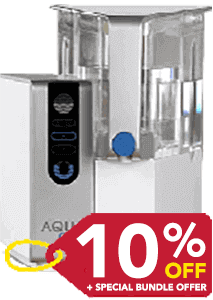 However, just because tap water meets the minimum safety standards does not mean it’s always contaminant free!
However, just because tap water meets the minimum safety standards does not mean it’s always contaminant free!
The good news is that getting fresh, clean and safe drinking water is easy.
The market is full of so many different types of water filters. You can easily find a way to purify your water whatever your budget is.
In fact, making your own homemade DIY water filter is possible if you don’t have any money!
Everyone knows that the human body needs a good amount of hydration to stay alive.
The survival rate of living without water is around 3 days.
 So it’s of no surprise that your body does not work properly if you don’t drink enough water.
So it’s of no surprise that your body does not work properly if you don’t drink enough water.
To do this you first need to calculate your right amount of daily water intake. Once you know what your number is, make this your new target and keep an eye out for the signs of dehydration.
AquaTru Water Filter | Berkey Water Filter |
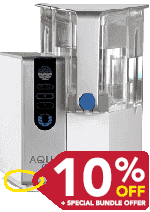 | 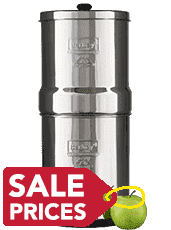 |
| - Arsenic: Approx 90% (unspecified). - Fluoride by 91.8% (WITHOUT extra filters). - Lead 97.5% - Benzene 99.9% - Chlorine 96.6% - Cysts 99.99% | - Arsenic by 99.9% (special filters required). - Fluoride by 99.9% (special filters required). - Lead 97.5% - Benzene 99.8% |
| Available in 1-size only. | Available in various sizes. |
| Plastic materials. | Metal & plastic materials. |
| Number of filters: 3 | Number of filters: 2 - 4 |
| Filter methods: Mechanical, Reverse Osmosis & Activated Carbon filters. | Filter methods: Black microporous-filters & white fluoride Filters |
| 4-stage filter process. | 2-stage filter process. |
| Holds a maximum water capacity of 3-quarts. | 2.25 Gallons |
| 45.7 x 45.7 x 38.1 cm | 19" High x 8.5" Diameter |
| System: 1 year limited warranty. | Filters: 2 years; System: 1 year. |
| Full Performance Data Sheet (AquaTru). | Berkey Contaminants List NSF/ANSI test results |
| SPECIAL OFFER? Yes, use code MRWATERGEEK  | SPECIAL OFFER? Yes, Big Berkey bundle sale |
 | |
Extended Scientific Bibliography
Importance of water filtration resources:
Eftekhar, B., Skini, M., Shamohammadi, M., Ghaffaripour, J., & Nilchian, F. (2015). The Effectiveness of Home Water Purification Systems on the Amount of Fluoride in Drinking Water. Journal of Dentistry, 16(3 Suppl), 278–281.
Supritam Dutta, Kaushik Nath. Prospect of ionic liquids and deep eutectic solvents as new generation draw solution in forward osmosis processReview Article Pages 163-176
Agency for Healthcare and Research Quality. Prevention quality indicators technical specifications. AHRQ; Rockville, MD: 2010.
World Health Organization, World Health Statistics 2012, World Health Organization, Geneva, Switzerland, 2012.
World Health Organization, Microbial Fact Sheets, http://www.who.int/water_sanitation_health/dwq/gdwq3_11.pdf.
Ann M. Gottinger, Dena W. McMartin, Doug Price, Bruce Hanson. No access The effectiveness of slow sand filters to treat Canadian rural prairie water. Canadian Journal of Civil Engineering, 2011, 38(4): 455-463





